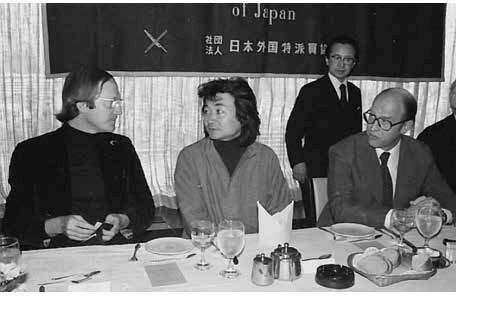Issue:

Seiji Ozawa, the Music Director of the Boston Symphony Orchestra, shared his views with Club members on March 17, 1978. Here, he is about to receive a name card from David Tharp (Freelance), FCCJ Secretary, while President Frederick “Ted” Marks (UPI) looks on. David Tharp, who later transformed from journalist into physician specializing in psychotherapy, participated in efforts to relieve posttraumatic stress disorders following the earthquake and tsunami in March of 2011. David died in October of 2012 at the age of 68 while on a visit to the U.S. Ted Marks also passed away earlier in the same year at age 69.
Seiji Ozawa, however, is still going strong at age 82. Although he had practiced piano at a young age, a hand injury resulted in a switch to conducting. In 1959 he won the top prize at an international competition in France, which brought him under the wing of Charles Munch, Director of the Boston Symphony Orchestra. He later received a scholarship to study under Herbert von Karajan. Then he caught the attention of Leonard Bernstein, who made him assistant conductor of the New York Philharmonic in the early 1960s, a position that led to his first professional appearance in 1962 with the San Francisco Symphony.
On a trip to Japan in December of 1962, disputes with players of the NHK Symphony Orchestra led to the cancellation of a performance (and a feud that only ended some three decades later when, according to an AP report, he led the famed orchestra in a charity concert for disabled musicians in 1995).
He led the Japan Philharmonic Orchestra as well as conducting the orchestras of Chicago, Toronto, San Francisco, Singapore and various others until his appointment as Musical Director of the Boston Symphony Orchestra in 1973. That appointment lasted for 29 years, during which time his achievements included several Emmy Awards. In 1984, together with Kazuyoshi Akiyama, he formed the Saito Kinen Orchestra in honor of an early Japanese musicologist mentor, that brought international Japanese musicians back to their homeland for annual concerts.
Known for his unorthodox conducting wardrobe, consisting of a white turtleneck in place of the traditional white tie garb and his lion’s mane hairstyle, Seiji Ozawa was not averse to controversy. He feuded with NHK, demanded changes at the Tanglewood Music Center and was entangled in battles over the quality of his work in Boston that contributed to his relinquishing a formal role there in 2002. But he has continued to lead major international orchestras in addition to being a modernist in classical music. Health problems, including esophageal cancer in 2010, have mostly brought an end to his active career. His achievements have been recognized by many awards over the years, including Japan’s Order of Culture.
– Charles Pomeroy,
editor of Foreign Correspondents in Japan,
a history of the Club that is available at the front desk

